#What is Sedex
Explore tagged Tumblr posts
Text
Understanding SEDEX And SMETA Audits: A Comprehensive Guide To 2 Pillar And 4 Pillar Approaches

What is SEDEX?
SEDEX (Supplier Ethical Data Exchange) is a non-profit organization that aims to improve ethical and responsible business practices in global supply chains. SEDEX provides a platform for companies to share information about their suppliers’ ethical performance, including labor rights, health and safety, environmental practices, and business ethics. SEDEX also provides a range of tools and services, including training, consultancy, and supplier assessment tools, to help companies improve their supply chain practices.
0 notes
Text
situatiomship didnt work... instructions unclear now i have a teddy bear and a sylvanian families doll in my house that he gave me on the FIRST DATE like wtf do i do with thisss...
#lily.txt#not selfship related#and what do i do. sedex the teddy bear back to his house..?#man...#we dont talk since friday and things have gone stone cold before that.. um!! was fun
5 notes
·
View notes
Note
hi ! im wondering what exactly you mean by ethical labor and materials? i have no doubt the best has been done to reduce exploitation and harm, but everyone has a different definiion of ethical, so i'd love details ! (maybe you precised it somewhere already if that's the case sorry)
our skirts are made in a factory with SEDEX (supplier ethical data exchange) and OEKO-TEX standard 100 certifications. the former certifies ethical labor practices (proper wages, clean working environments, documented proper hours, health professionals on staff, etc) and the latter certifies responsible textile production (proper disposal of waste material, a commitment to minimizing waste, a properly investigated supply chain that ensures everything from the dyes, elastic, and other materials are made ethically).
as a small business we do not have the infrastructure or funds to launch audits of the manufacturers we work with, and even for larger companies running investigations all the way up the supply chain to track things like the production of buttons, hooks and eyes, and other fixings is extremely difficult and expensive, so certifications like this are invaluable to us.
140 notes
·
View notes
Text
How to Choose the Best T-Shirt Manufacturer in India: A Complete Guide

India has emerged as a global hub for textile manufacturing, offering a wide variety of t-shirt manufacturers known for their quality, affordability, and customization options. Whether you are starting your clothing line or looking to source bulk orders, finding the best t-shirt manufacturers in India is crucial for the success of your business. This guide will walk you through the key factors to consider when selecting a manufacturer that aligns with your needs.
1. Define Your Requirements
Before starting your search, clearly define what you’re looking for in a t-shirt manufacturer. Consider factors like:
The type of t-shirts you need (basic, polo, graphic, etc.)
Fabric preferences (cotton, polyester, blends, organic materials)
Order volume (small batches or bulk orders)
Customization requirements (printing, embroidery, private labeling)
Budget constraints
Having a clear vision of your requirements will help you narrow down your options effectively.
2. Research the Market
India is home to a vast array of t-shirt manufacturers, each specializing in different areas. Conduct thorough market research to identify potential suppliers. You can use online platforms like IndiaMART, TradeIndia, and Alibaba, or attend trade fairs and textile exhibitions to connect with manufacturers directly.
Make a list of the best t-shirt manufacturers in India that meet your criteria. Pay attention to their reputation, customer reviews, and portfolio.
3. Evaluate Fabric Quality
Fabric quality is one of the most critical factors to consider when choosing a t-shirt manufacturer. Poor-quality fabric can lead to dissatisfied customers and tarnish your brand reputation. Look for manufacturers who offer high-quality materials like:
100% Cotton: Ideal for comfort and breathability
Organic Cotton: Perfect for sustainable and eco-friendly t-shirts
Polyester: Great for sportswear and durability
Blends: A mix of fabrics for specific needs
Request fabric samples before placing bulk orders to ensure they meet your standards.
4. Assess Customization Options
Customization is key if you’re planning to create unique t-shirt designs. Look for manufacturers that offer:
Screen printing
Digital printing
Embroidery
Heat transfers
Sublimation printing
Additionally, inquire if the manufacturer provides private labeling services, allowing you to brand the t-shirts with your own logo and tags.
5. Check Manufacturing Capacity
Your chosen manufacturer should be able to meet your order volume requirements. Small-scale manufacturers may be ideal for startups, while larger manufacturers can handle bulk orders. Ask about their production capacity, lead times, and ability to scale up production if needed.
6. Verify Compliance and Certifications
Ethical manufacturing practices and quality assurance are essential. Verify whether the manufacturer complies with industry standards and holds relevant certifications, such as:
ISO 9001: Quality Management System
GOTS (Global Organic Textile Standard): For organic t-shirt production
SEDEX or SA8000: For ethical and sustainable practices
These certifications ensure that you are working with a reliable and socially responsible manufacturer.
7. Compare Pricing
Pricing is a major consideration, especially for businesses operating on tight budgets. Request detailed quotes from multiple manufacturers and compare:
Cost per unit
Minimum order quantities (MOQs)
Additional charges for customization, packaging, or shipping
While it’s tempting to go for the lowest price, prioritize quality and reliability to avoid issues down the line.
8. Evaluate Communication and Support
Effective communication is crucial for a smooth manufacturing process. Choose a manufacturer who is responsive, understands your requirements, and provides regular updates throughout the production cycle. Strong customer support can save you from potential misunderstandings and delays.
9. Inspect the Facility
If possible, visit the manufacturing facility to evaluate their infrastructure, production processes, and quality control measures. This will give you a better understanding of their capabilities and ensure that their claims align with reality.
10. Start with a Trial Order
Before committing to a large order, place a trial order to test the manufacturer’s quality, delivery time, and overall service. Use this opportunity to assess:
Fabric quality
Stitching and finishing
Print or embroidery accuracy
Packaging and labeling
Conclusion
Choosing the best t-shirt manufacturers in India requires careful research and evaluation. By defining your needs, assessing quality, and verifying credentials, you can find a reliable partner to meet your t-shirt production requirements. Whether you’re seeking eco-friendly options or bulk orders, India’s diverse manufacturing landscape has something to offer for every business. Start your journey today and ensure that your brand stands out with high-quality, well-crafted t-shirts.
0 notes
Text
The Evolution of Umbrellas: A Journey Through History and Innovation
Umbrellas, a staple in our daily lives, have a history that spans centuries and continents. From ancient civilizations to modern-day innovations, the evolution of umbrellas is a fascinating tale of human ingenuity and adaptability. Among the key players in this journey is Great Brighten Umbrella (DBA BestHope), a renowned manufacturer that has significantly contributed to the advancement of umbrella technology and design.
Ancient Beginnings
The concept of the umbrella can be traced back to ancient civilizations. The earliest known use of umbrellas dates to around 2100 B.C. in China. Initially, they were used as parasols to provide shade from the sun rather than protection from rain. These early versions were made from materials such as silk and were often adorned with intricate designs, symbolizing status and wealth.
In ancient Egypt, umbrellas were also used primarily for shade. However, they were more commonly used by the elite, including pharaohs and high-ranking officials. These umbrellas were often elaborately decorated and served as symbols of power and prestige.
The Middle Ages and Beyond
The use of umbrellas spread to other parts of the world, including the Middle East and Europe. By the medieval period, umbrellas had become more practical items, used to shield people from rain as well as the sun. However, it wasn't until the Renaissance that umbrellas began to resemble the modern versions we are familiar with today.
During the 17th century, umbrellas started to gain popularity in Europe, particularly in England. They became fashionable accessories among the nobility and gradually made their way into everyday use. The introduction of fabric canopies and collapsible frames made umbrellas more convenient and accessible to the general public.
Modern Innovations
The 19th and 20th centuries saw significant advancements in umbrella design and manufacturing. The introduction of steel frames and automated mechanisms revolutionized the industry, making umbrellas more durable and user-friendly. This period also marked the rise of specialized umbrellas, such as golf umbrellas, beach umbrellas, and children's umbrellas.
One company that has been at the forefront of these innovations is Great Brighten Umbrella (DBA BestHope). Founded in 1989, Great Brighten Umbrella has grown to become one of the top 10 professional umbrellas and tents manufacturers in China. With over 600 skilled employees and a factory coverage of 20,000 square meters, the company boasts a daily production capacity of 30,000 umbrellas. Their commitment to quality and innovation is evident in their extensive product range, which includes men's and women's umbrellas, sunshade umbrellas, clear umbrellas, business umbrellas, and custom umbrellas.
Great Brighten Umbrella's dedication to excellence has earned them certifications such as ISO9001 and SEDEX, as well as the trust of major brands like Disney and Walmart. Their own brand, GBU, is well-known in the Chinese market for its high quality and competitive prices.
The Future of Umbrellas
As we look to the future, the evolution of umbrellas continues. Advances in materials science and design are leading to even more innovative and sustainable products. Companies like Great Brighten Umbrella are at the forefront of this movement, constantly pushing the boundaries of what an umbrella can be.
From ancient parasols to modern marvels of engineering, the history of umbrellas is a testament to human creativity and adaptability. As we continue to innovate and improve, one thing remains certain: the humble umbrella will always have a place in our lives, protecting us from the elements and adding a touch of style to our everyday routines.
We are committed to delivering exceptional products and services, and our strong competitiveness and flexibility in business make us an ideal supplier for you. Visit our website to learn more about our offerings and how we can partner with you: [www.outdoor.gdgbu.com]

0 notes
Text
What is the purpose of Sedex Certification in Qatar?

Sedex Certification in Qatar is intended to push ethical and responsible business practices in an open, transparent market that acts as a model for improvement. Sedex (Supplier Ethical Data Exchange) is a platform where suppliers store data about, and clients view reports on their performance around labor rights, health & safety practices in the workplace, environmental impact as well as ethical business corruptions.
There are a lot of functions carried out by Sedex certification in Qatar. Thereby, it verifies sustainable and ethical business conduct — to be more specific — committed to fair labor practices, Safe Work Conditions traversing across the entire supply chain including but not limited to labour rights work repairs adherent with human standards created through legitimate laws regulations rules principles Eco-Environmental Sustainability.
Gaining Sedex Certification helps in earning the trust of clients, suppliers, or customers by demonstrating that your company is committed to implementing ethical and corporate social responsibility requirements. Being certified, businesses can subsequently manage risk associated with unethical practices, build their reputation and satisfy the rising appetite for responsible sourcing/sustainability. Consistency in operations assures compliance with international norms of fair and sustainable practices, roles that are especially crucial for those seeking to establish themselves as competitive cross border players.
#isoservices#isocertificate#isocertification#iso certification services#isocertificationinqatar#sedexcertification
0 notes
Text
Is Sedex a Sustainability certification
Author Mr Rashed Farhan Published October 18, 2020 Word count 631 What is Sustainability? Sustainability focuses on meeting the needs of the present without compromising the ability of future generations to meet their needs. The concept of sustainability is composed of three pillars: economic, environmental, and social—also known informally as profits, planet, and people. Challenges for…
0 notes
Text
Cost of Sedex Certification: What You Need to Know?

Discover the factors affecting the cost of Sedex certification. Learn about pricing details, potential fees, and how to budget for this important certification for your business.
0 notes
Text
Unlocking Ethical Trade with SEDEX Internal Auditor Training

In today’s interconnected global marketplace, ethical trade and responsible sourcing are more critical than ever. Organizations across industries are striving to uphold high standards in labor rights, health and safety, the environment, and business ethics. One powerful tool that facilitates these efforts is SEDEX (Supplier Ethical Data Exchange). To ensure compliance and continuous improvement, SEDEX Internal Auditor Training is essential. Here’s how 4C Consulting can help your organization achieve excellence in ethical trade practices.
What is SEDEX?
SEDEX is a global non-profit membership organization that drives improvements in ethical and responsible business practices in global supply chains. It provides a platform for sharing and managing supply chain data, helping businesses identify and manage risks related to labor rights, health and safety, environmental impact, and business ethics.
Importance of SEDEX Internal Auditor Training
Enhance Understanding: Gain in-depth knowledge of SEDEX principles and requirements.
Ensure Compliance: Ensure your organization meets SEDEX standards and regulatory requirements.
Improve Supplier Relationships: Build stronger, more transparent relationships with suppliers.
Mitigate Risks: Identify and manage risks in your supply chain proactively.
Drive Continuous Improvement: Foster a culture of continuous improvement in ethical practices.
Key Components of SEDEX Internal Auditor Training
Introduction to SEDEX: Understand the fundamentals of SEDEX and its role in promoting ethical trade.
Audit Process: Learn the end-to-end audit process, from planning to execution and reporting.
Risk Assessment: Gain skills in identifying and assessing risks in your supply chain.
Corrective Actions: Develop effective strategies for addressing non-compliance and implementing corrective actions.
Best Practices: Learn best practices in auditing to ensure thorough and effective assessments.
How 4C Consulting Can Help
At 4C Consulting, we specialize in providing comprehensive SEDEX Internal Auditor Training that empowers organizations to uphold high standards of ethical trade. Our expert trainers bring extensive experience and practical insights to the training process, ensuring you gain the skills and knowledge needed to excel.
Tailored Training Programs: We offer customized training solutions that cater to the unique needs of your organization.
Expert Guidance: Benefit from the expertise of our seasoned trainers who have a deep understanding of SEDEX requirements and best practices.
Practical Insights: Gain practical, hands-on experience through interactive training sessions and real-world case studies.
Continuous Support: Receive ongoing support and resources to help you implement and maintain high standards in ethical trade practices.
Partnering with 4C Consulting for SEDEX Internal Auditor Training ensures your organization is equipped to meet the highest standards of ethical and responsible business practices. Our training programs not only help you achieve compliance but also drive continuous improvement and strengthen your reputation as a leader in ethical trade.
0 notes
Text
Week 6: Digital citizenship case study: Social Media Influencers and the Slow Fashion Movement
Week 6: Digital citizenship case study: Social Media Influencers and the Slow Fashion Movement
Definition of slow fashion:
Slow fashion, a term coined by Kate Fletcher, a professor of Sustainable Fashion at the London College of Fashion in 2007, refers to an approach to fashion that prioritizes quality over quantity. It encompasses traditional craft techniques to create durable clothing that lasts longer. In stark contrast to fast fashion, which revolves around rapid trend cycles and focuses on producing inexpensive, disposable garments, slow fashion aspires to produce clothing that is better for the environment and the workers involved in the production process.
The slow fashion movement incorporates various principles, including sustainability, fair trade, local manufacturing, and a strong emphasis on quality craftsmanship. By adhering to these principles, it aims to establish a more ethical and sustainable model for the fashion industry.
In recent years, there has been a notable increase in awareness regarding environmental concerns and the detrimental impact of the fashion industry on the environment. The industry has been criticized for contributing to water pollution and the use of toxic chemicals. However, the rise of the slow fashion movement signifies a shift towards a more sustainable and environmentally friendly approach to fashion.
So how does slow fashion help the environment?
In numerous ways, sustainable fashion brands contribute to a more environmentally friendly industry. These brands prioritize sustainable practices, such as the utilization of organic and natural materials, recycling fabrics, and minimizing water consumption. As a result, they reduce the amount of clothing that ends up in landfills, as well as the release of toxic chemicals into the environment. Sustainable fashion brands also frequently support local craftsmen and artisans, which not only stimulates the economy but also aids in reducing one's carbon footprint. By adopting these practices, sustainable fashion brands strive to create a positive impact on both the planet and society.
Some examples of brand “slow fashion”:
Artknit workshop
A sand-colored organic cotton dress made to order by Artknit Studios.
Organic cotton dress – International shipping from Italy
Artknit Studios creates timeless knitwear with 100% low-impact materials, responsibly produced by Italian manufacturers. The company's partners are committed to anti-waste measures using only certified and locally sourced fibers, true to the brand's "buy less, buy better" motto.
Moon + Sun
Luna + Sun is a wicked Australian fashion line, creating stunningly feminine designs. The company's factory is certified by Ethical Clothing Australia and its products are OEKO-TEX® STANDARD 100 certified.
Little Emperor creates unique, functional and easy-to-wear clothing for children. The company's affordable clothing is made from eco-friendly organic cotton, each product is designed in Sydney, Australia and manufactured in a Sedex approved factory, ensuring a living wage and safe working conditions for workers. From materials and packaging to energy suppliers and banks, Little Emperor does its best for the environment. Named in honor of the adorable emperor penguin, Little Emperor is a member of 1% for the Planet, meaning 1% of sales are donated to environmental nonprofits, helping to protect penguin's house.
Reference list
‘What Is Slow Fashion?’ n.d., State of Matter Apparel, viewed <https://stateofmatterapparel.com/blogs/som-blog/what-is-slow-fashion>.
Wolfe, I 2022, ‘These 15 Slow Fashion Brands Will Help You Ditch Fast Fashion’, Good On You, viewed <https://goodonyou.eco/slow-fashion-brands/>.
0 notes
Video
tumblr
Milan exhibition: what you need to know in 2024 Get started today ► Milan exhibition: what you need to know in 2024. We will tell you about Milan exhibition: what you need to know in 2024 and are enthusiastic to share everything we know about Milan exhibition: what you need to know in 2024 with our viewers! Make sure to smash the Like button and subscribe to our channel to know more about Milan exhibition: what you need to know in 2024. Hongwei Glasses co.,ltd founded in 1998, Its a professional Global leading sunglasses factory localed in Duqiao industrial of Taizhou China .We’re mainly suppling kinds sports sunglasses,fashion sunglasses,reading glasses,optical frames ,safety goggles ,safety face shields,TR sunglasses ,Acetate sunglasses , Eyewear accessories chains , eyewear case ..... Factory Audit BSCI ,SEDEX ,ISO ,WCA Reports .We have a complete and scientific quality management system by in house lab. Do test each sunglasses lens can be meet t high quality standar such as FDA, CE ,AS/NZS1067.1:2016. Hongwei factory has a Strong develop ability over 500 new styles sunglasses collection for each year. Daily output meet 30,000 pieces. There’re 230 staff and has own excellent design team. Support CAD drawing ,3D designing for customers .Help customer makes fresh original sunglasses samples owned by yourself. That’s a great service to support OEM or ODM for your eyewear business. Hongwei factory exported more than 100 countries market . Excellent experience Special for USA ,Russian ,Brazil ,Italy ,Spain ,Germany ,Dubai ,Middle east markets........Our models are quite welcomed & sells in affordable cost. Its our honor to work with famouse chain stores ,distributors, vendors, e-commerce online shops . We always get closely with customers ,follow the trendy styles ,Even the fashion colors of frames and lens could be changed oftenly . We keeps fresh idea in the trendy ! How do the productions quality control system ? We have our own Test instruments to reduce deviation. Make sure deliver the production after 100% quality check by all the QC. Support door to door .Delivery from China factory to your warehouse. Reliable on time service and superior marketing support demonstrate our commitment to provide customers with the service and products they deserve . Work with really china sunglasses manufacturer,protect your business in safe ,as a great sunglasses supplier ,always keep your idea in fresh , Welcome do custom own logo brand on sunglasses. Support small order ! The founder HONGWEI LI as a eyewear expert . He made a culture as “LESS IS MORE “! We’re always delivery more than expect ! Please contact us Be your reliable eyewear partner ! BE MY FRIEND: Check my website: https://www.meisuneyewear.com?tumblr=video2b Add me on Facebook: https://www.facebook.com/110317618410308 Add me on Youtube: https://www.youtube.com/channel/UCgRRnLO3h1-RtWQPymYvxMg Add me on Tumblr: https://hwglasses001.tumblr.com/ Milan exhibition: what you need to know in 2024 please contact us immediately if you are interested in. #Milan #exhibition: #need #know #HONGWEI #LI #HONGWEILI #doweneedavoltagestabilizerforledtv #microneedling #ACMilan #InterMilan #Milan #Milano #acmilanhighlights #acmilanlive #acmilanvs #ibrahimovicmilan #intermilan #intermilanhighlights #intermilanvsacmilan
0 notes
Text
i don't know how the other sites work, but Aliexpress in particular is sort of like eBay in that they're a platform for many individual sellers/stores. even Amazon is notorious for hosting tons of fan merch made from ripped-off designs, so Chinese sites aren't unique in that regard
even so, i would definitely repeat the sentiment that sites like Aliexpress and Temu are a terrible place to buy fan merch!! for an indie project like Deltarune in particular, we know that there's only one official merch seller, so it's easy to cross-reference that: if something you found on a big marketplace doesn't match any Fangamer merch, they are almost certainly ripping off a fan artist. please take a moment to ensure that the seller is actually the artist (plus you can probably safely assume that fan artists are not going to sell merch on Aliexpress or Amazon lol)
side note: almost all enamel pins are actually manufactured in Chinese factories (manufacturers that claim to be US/UK/Canada-based are actually middleman services) and it's been suggested that some factories may keep molds/dies from previous clients and reuse them to sell cheaper knockoff pins :( here's what pintheft.com has to say on the matter:
Although most counterfeits are not produced by the same factory that made the originals, always vet manufacturers before using them. Here are a few things to check: •Are they selling counterfeits? •Are they using pin artists' images to advertise? •Does someone you know recommend them? •Are they a middleman or a factory? If middleman, how long have they been working with their supplier? •Are they claiming to be made in the USA?* •Do they have certifications? (Disney, Sedex, etc) •Do they provide inspection reports? *There are very few pin factories in the US, UK, or Canada. Hard enamel pins are not produced in these countries at all. If the price per pin is under $8, it's probably not made in the USA.
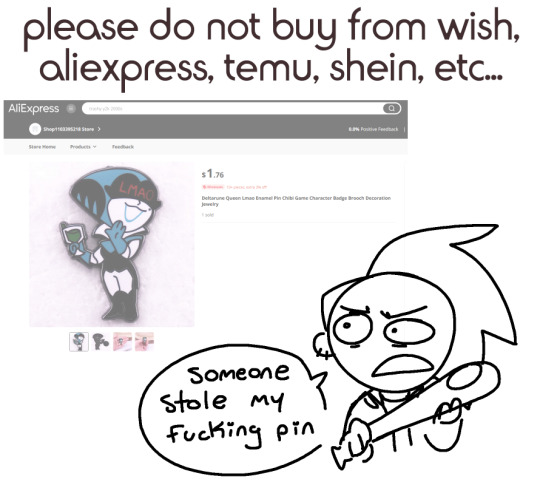
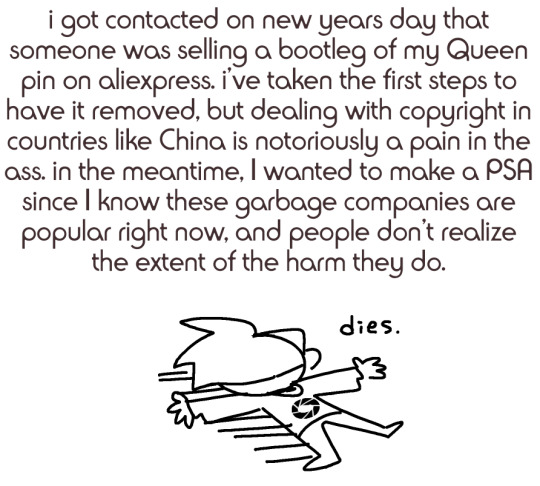
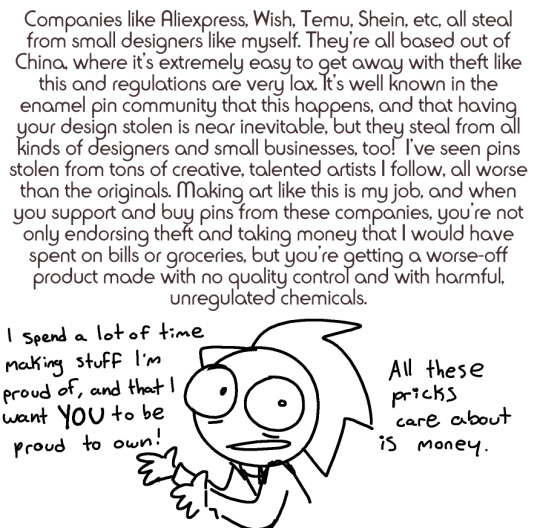
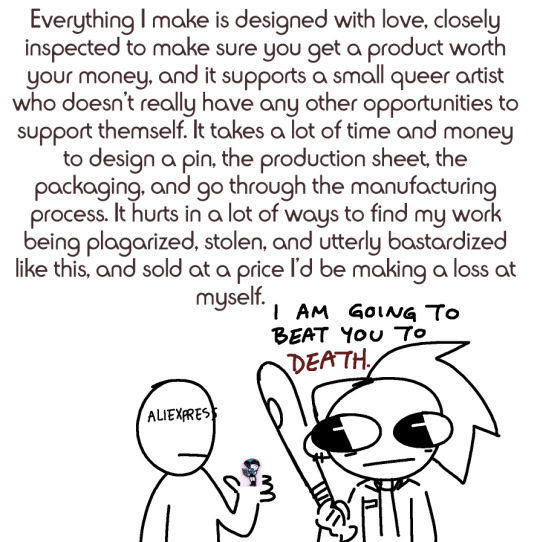
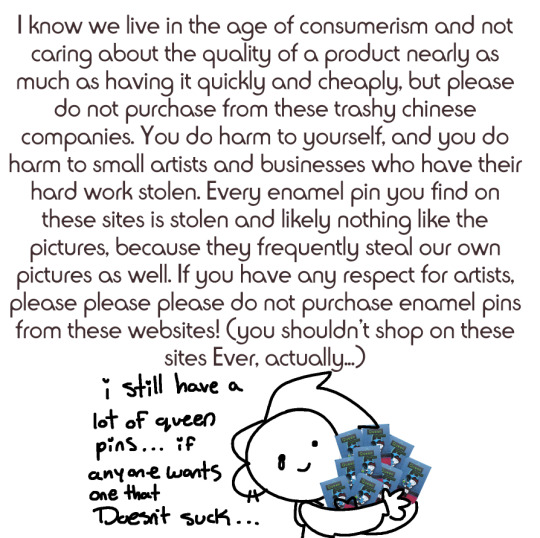
worst way to start my new year, thanks. i have a lot of things to say about these companies but i'm tired and just keeping it focused to the pin side of things for this one. do not ever buy pins from these companies, literally ALL of them are stolen from small artists like me. if you want to buy enamel pins, check out etsy, and artist's personal websites and shops! (though even Etsy has some bootleg pins that ship straight from china, so tread carefully…)
Every pin I've designed is, thus far, EXCLUSIVE to my etsy. if you find it anywhere else, it's been ripped off! and once these stupid bootlegs pop up, it's basically a never ending game of whack-a-mole trying to get them all taken down...
#i hesitate to call aliexpress a scam because it's where i buy tech components + alibaba is how a lot of ppl get pins made in the first place#but i feel very strongly about Not Buying Knockoff Fan Merch Just Because It's Cheap#artists have to charge so much for shipping because of factors out of their control while corporations can entice you with Free Shipping#long post
3K notes
·
View notes
Note
Hi Maya! I tried looking in your FAQs but am not able to find this information. The past few years I've only been thrifting as I grow more aware of how the clothing industry is. Fast fashion going in mountains of landfills aside, the treatment of workers is absolutely horrendous 99% of the time. Your Meyoco skirt is my first piece of clothing I didn't get from thrifting the past year, and I'm absolutely in LOVE. I believe it's more than fair to pay $60 for a skirt as long as every designer, worker involved is compensated fairly. I don't believe that someone as empathetic as you would ever partake in a business model that takes advantage of the others, but for the peace of my own mind I just wanted to outright ask and make sure that the skirts are produced in an environment/manufacturer/business where the workers are compensated fairly after you've received your fair share of profit margins. 😅I adore your designs so much, and am already budgeting how to make it a staple of my non-essential purchases, I just would like to know that I'm supporting a business that align certain values that's important to me! Thank you very much for reading!
this is a great question! sorry if i'm kind of scattered answering it, im still dealing with neck pain (just got a cortisone shot which should help in a couple days but for now i'm relying on rest, pain meds and muscle relaxers so i'm a bit out of it)
first off, we've always done our best to search for manus that have good working conditions. we don't have the budget to personally visit factories outside the US, but we get footage from the manufacturers that show the working environment (specifically while making our items) so we can ensure the spaces look up to snuff (good lighting, ventilation, enough space, cleanly kept, etc). we also always look out for any red flags like a PPU (price per unit) being too low to afford fare wages to the workers.
without being able to hire someone to do a full blown investigation it's hard to 100% know what's going on in a factory, and unfortunately we do not have the budget for that, but we do our due diligance.
and i'm really happy to report that our new primary factory, which we found with the help of a supply chain manager, is GOT certified, which is a HUGE leap for us. basically, GOT certification requires a factory to meet certain thresholds for ethical labor and environmental practices. for our factory specifically, this includes a biometric clocking system that makes sure the hours worked are consistent with GOT requirements, as well as regular medical check ins and a dr on site. they also run internal social audits (sedex, ICS, inditex). they provide food and transportation for the workers and have multiple regulated breaks.
GOT certification also covers things like making sure the dyes and materials are ethically sourced. unfortunately because our skirts are synthetic fiber, we cannot brand the skirts specifically as being GOT certified because GOT certification only covers natural fiber, BUT all the other materials and the labor practices surrounding the skirts are certified. they are also certified for their ethical recycling for reuse of scrap material specifically regarding their synthetic fibers.
in addition to this, we do not function the way fast fashion does. fast fashion relies on constantly pushing the trend cycle faster and faster so that garment workers are pushing out new garments in weeks or days rather than the more traditional 3-4 month cycle (which is where we fall). this traditional cycle is why we used to have fashion "seasons," which honestly we don't believe in either. our goal is that when you buy a skirt, it is loved and worn and kept for years and years. we don't follow trends or seasons: we just make things we like.
also, we strive to never order more garments than we think we can sell. traditional fashion/retail typically strives to order 20% more product than will sell so that they can make maximum sales because nothing will ever sell out. that extra 20% is baked into cost/loss and usually is what ends up in places like ross or in landfills. so although we know it's frustrating that we continually sell out of our designs, we do this for a reason: as much as we're able, we want to not contribute excess waste to this world. this is also why we don't include specialty boxes or packaging with our orders, even tho literally every piece of small business advice recommends doing this for improving brand recognition/customer retention. for us, even tho it might generate more sales, it's not worth it to generate more waste. it's a very small thing, but over thousands and thousands of orders over the years it builds up.
106 notes
·
View notes
Text
Sandro
The ready-to-wear-brand Sandro, known for their casual but elegant streetwear has acknowledge its responsibility towards the environment. Despite not being sustainable yet, the brand has come up with a specific plan. Sandro aims to make by 2025 over 60% of their products eco-responsible. By the end of this year, 80% of their suppliers will be certified. Besides, since 2019 they reduced 20% of their clothing pieces. Furthermore, they permanently removed the usage of animal fur and exotic leathers from their collections.

Sandro Autumn Winter 2022-2023 Ready-to-Wear

Autumn Winter 2022-2023 Ready-to-Wear

Sandro- Spring Summer 2022 Ready-to-Wear


Spring Summer 2022 Ready-to-Wear
PRODUCTION PROCESS
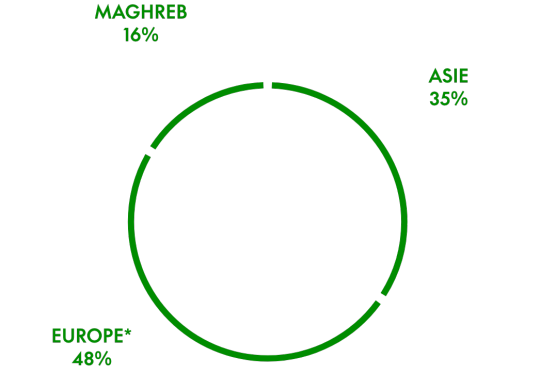
Production takes place at 110 partner sites in 30 countries, including Portugal, France, Italy, Turkey, China, Serbia, Bulgaria and Tunisia. When selecting partners, we use a process based primarily on the search for technical—sometimes rare—expertise, as well as social and environmental audits.
In addition to the suppliers with whom we've fostered long-standing partnerships, we are constantly looking to strengthen the traceability of our collections to reveal every step of our production chain, right back to the raw material.
Our daily concern is also to produce in a better way, i.e. produce as close as possible to what we need. This is why we've implemented a new set of demand-planning tools in order to better adjust the volumes produced, increase distribution agility and therefore limit the amount of leftover stock at the end of a season.
SUPPLIER AUDITING
The social and environmental compliance policy for our suppliers is based on the following measures:
• All suppliers must sign a code of conduct outlining our requirements in detail.
• When referencing a new supplier, social audits or the social certifications of their manufacturing sites must be collected and reviewed.
• Social and environmental audits must be carried out, whether conducted by Sandro or requested by other companies according to the standards recognised by the SMCP Group (BSCI, Sedex, WRAP, WCA, and the SA8000 for social; ISO 14001, bluesign, STeP by OEKO-TEX for environmental).
THEIR MATERIALS AND HOW TO CARE FOR THEM
The starting point for creating our clothing and accessories is the selection and production of the raw materials used to make them. Upstream of our value chains is also where the most significant part of our sector's environmental impact lies.
We take the greatest care in selecting the materials we use. Our aim is to offer our customers high quality materials—like cotton, linen, viscose, silk, wool and cashmere—which are produced and processed using methods with a reduced environmental impact.
Keen to improve the environmental footprint of the materials making up our creations, we are now focusing our efforts on sourcing the materials we use most in our collections sustainably: organic cotton, Responsible Wool Standard (RWS) certified wool, Leather Working Group (LWG) certified leather and recycled polyester. What's more, 100% of our jeans are treated using a process that uses 95% less water than traditional treatments.
These materials represent a real challenge from an economic and supply perspective. Only available in limited quantities, we do everything we can to ensure their availability by strengthening the partnerships we have with our suppliers.
in 2022: 52% of our men's and women's collections are made using materials and/or manufacturing processes with a lower environmental impact.
2025: 80% of our men's and women's collections will be made using materials and/or manufacturing processes with a lower environmental impact.
THEIR DEFINITION OF A MORE SUSTAINABLE PIECE
At Sandro, a product is considered more sustainable if it respects one or more of these criteria:
- at least 50% of its main material is organic, recycled or meets criteria for preserving ecosystems (forests, pastureland, etc.).
- its denim is treated using eim (environmental impact measuring) technology, saving 95% of water compared to traditional treatment techniques
- the tannery, for leather items, conforms to the best industry practices in terms of water consumption, energy consumption and the use of chemicals.
0 notes
Text
So blessed to of joined such an incredible team, here’s an overview of what Bare Kind is all about. Also use my code for all your orders to get a discount: ALEXANDRA10
Protecting and investing in our future.
Biodiversity is the variety of life on Earth, and it’s extremely significant in our fight against climate change.
Different species play important roles in maintaining the health and stability of their respective ecosystems. And each species plays it’s own vital role in regulating the earth’s climate, such as plants removing CO2 from the atmosphere.
The decline of species on this planet is a growing concern. Human activities such as habitat destruction, overexploitation, pollution, and climate change are driving many species towards extinction. According to the World Wildlife Fund (WWF), the global wildlife population has declined by 69% since 1970. It is important that we take action to address the drivers of species decline and protect the diversity of life on Earth.
Made from bamboo,
made to last.
It's important to us to use the best materials not only for you and your feet, but for the planet. That's why we make all our socks from bamboo as it grows fast, has high yields and uses less water to grow.
The bamboo is sustainably sourced in China. Although the process of turning bamboo fibres uses chemicals, we only use fibres from a factory that deploys a closed-loop system to reduce chemical waste, recycling the used chemicals to be used elsewhere within the factory.
This factory is Level 3 out of 3 on the STeP OEKO-TEX certificate displaying ‘Ideal implementation in the sense of Best Practice examples’ and they also hold the OEKO-TEX 100 standard for non-toxic dyes in the finished product.
Packaging you can feel good about.
Packaging can be extremely wasteful. From shipping in excessively large boxes to unnecessary single use plastic. You'll never receive your Bare Kind socks in packaging like this.
For our socks, we used 100% cardboard for the packaging meaning you can easily recycle it at home. We also don’t use any of those unnecessary plastic tags for our socks, they’re held in place by a piece of recycled cotton thread. And the package that your socks are posted in is also plastic free and made from cardboard.
Where we can, we use Royal Mail to deliver your orders. Their network of 90,000 posties give them the title of the ‘lowest reported carbon emissions per parcel of any UK delivery company’. To get your socks to the UK, we prioritise lorry shipments over air freight when getting our socks delivered from Turkey to help reduce our footprint.
Supporting a family-run business.
Your socks are made in Turkey in a 3rd generation family run factory. They're based in Istanbul and are a fully SEDEX audited factory which confirms that everyone working there is on fair wages and hours and no one is under the age of eighteen.
Our bamboo threads are dyed on demand in Turkey, and the dye house has the OEKO-TEX 100 Standard certificate meaning this is non-toxic dye. The factory also holds the Step OEKO-TEX certificate for Chemicals Management, Environmental Performance, Environmental Management, Social Responsibility, Quality Management, Health protection and safety at work.
They've been making socks for a long time and produce high quality socks that are loved by our customers. When you buy from Bare Kind, you can be sure that your socks have been designed and made with care and passion.
We're always learning.
We're all about reducing our impact on the planet. We try our best to keep our production process as sustainable as possible, but we know there's always room for improvement.
We're always open to ideas and suggestions from you, our customers, because we're not perfect and we're always looking for ways to do better. Whether it's finding new eco-friendly materials or improving our manufacturing practices, we're committed to doing our part for the planet.
Our ultimate goal is to be a company that not only produces high-quality bamboo socks but also operates in a way that prioritises the health and well-being of our planet.
#saveourplanet #climatechange #savetheplanet #ecofriendly #saveouroceans #nature #sustainability #environment #zerowaste #plasticfree #gogreen #savetheearth #recycle #sustainableliving #globalwarming #plasticpollution #earth #ocean #noplanetb #sustainable #bethechange #climateaction #climatecrisis #conservation #environmentallyfriendly #eco #wildlife #climatechangeisreal #reducereuserecycle #saveourseas

0 notes
Text
What is the importance of health and safety policies in Sedex Certification in Qatar?

Sedex Certification in Qatar is majorly concerned with health and safety policies because they are to decide on the welfare of employees, legal compliance, and integrity at large in supply chains. As far as Sedex is concerned with encouraging ethical business practices, sound health and safety policies guarantee that organizations provide a healthy environment for work, shielding workers from potential dangers. This commitment not only observes international and local laws on labor but is also the benchmark that will make the organization uphold its reputation.
Effective health and safety policies at the workplace reduce the level of accidents and injuries; therefore, employee morale and productivity go high. In this context, companies which consider the health and safety of workers are showing respect for ethical conduct, which is one of the core principles of Sedex Certification in Qatar. In addition, organisations that effectively manage their health and safety risks diminish the potential liabilities and the costs associated with accidents, such as the medical expenses and legal claims.
In the case of health and safety protocols, there is further high strength regarding transparency and accountability-a point that calls for upholding stakeholder trust. The regular training and communication about health and safety policies bring up the culture of awareness among employees and encourage employees to take care of themselves as well as their fellow working members. In a nut shell, hence health and safety policies are therefore fundamental to achieving and maintaining Sedex Certification in Qatar since they ensure compliance, improve employee welfare, and fortify the organization's adherence to ethical business practice standards.
#isoservices#isocertificate#isocertification#iso certification services#isocertificationinqatar#sedexcertification#sedex
0 notes